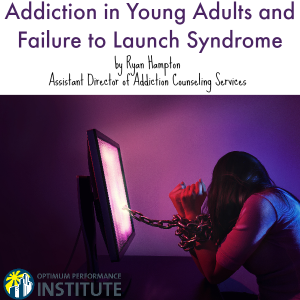Addiction in Young Adults & Failure to Launch Syndrome
For many young adults, identifying as an addict is a terrifying and foreign notion that doesn’t come easily and isn’t well understood by their peers. The field of addiction is growing and changing every day, with research continually working to identify the factors in the environment and genetic makeup of individuals that causes some people to latch onto certain substances and behavioral patterns in an unhealthy, addictive manner.
When addiction forms, a young adult may realize that their approach to their drug or behavior of choice is undeniably different from other people. Whether it’s an alcoholic drink, an illicit drug, or time spent in front of a computer screen, enough is never enough, and there is a constant pursuit of the reward that has become associated with this addictive behavior.
While an addiction to substances can often have obvious effects on an individual’s mental state and physical health, the secondary effects of addiction can be harder to recognize and just as problematic. Many addicts isolate themselves from others due to fear of judgment, agitation, depression, anxiety, or they end up mainly associating with peers that share an interest in their drug of choice. These social changes can damage relationships at work, school, and in the home and have a profound effect on the addict’s self-esteem.
The Cycle of Addiction and Failure to Launch
For young adults in today’s society, maturing and building a happy, successful life is a stressful process. Keeping up with school, work, and social obligations in a fast-paced world full of opportunities as well as distractions at every turn can be exciting and overwhelming all at once.
When addiction enters the picture, it can often tip the balance so that the young adult is burdened with distractions and complications to everyday life that are hard for their addiction-free peers to understand. This can manifest in a variety of ways, from chemical dependence to various substances that zap financial, cognitive, and emotional stability, to behavioral addictions such as computer addiction that take up excessive amounts of time and create maladaptive social skills and coping mechanisms.
While every addict is unique, the common ground they share is that their lives have become unmanageable based on their pursuit of an external reward that doesn’t serve them in a healthy, productive manner. When every day is spent managing the anxiety and emotional volatility associated with any addictive process, commitments to career, education, personal health, and social activities are easier to forget or ignore.
Unfortunately, simply recognizing the issue and trying to change is rarely successful and often leads to feelings of shame, helplessness, and depression. For the addict who already relies on substances to deal with emotional pain, this can actually increase substance abuse, thus continuing the cycle and further limiting the opportunities to grow and enjoy a healthy, happy life.
Stopping the Cycle
For the young adult who sees the effect of addiction in his or her own life and wants to make a change, residential treatment at Optimum Performance Institute (OPI) can provide the opportunity to make that change in a supportive environment, individualized with his or her own goals in mind.
OPI believes in treating the whole person, so participants with substance abuse issues will receive support with maintaining sobriety and while also pursuing career, educational, and extra-curricular activities and managing any and all co-occurring psychological disorders.
We focus on meeting young adults where they are at, offering services such as one-to one counseling, addiction-related process groups with like-minded peers, and participation in local 12-step or other recovery groups.
After young adults are able to achieve a level of stability in their sobriety, the next question is often “What now?” We understand that the key to success for young adults with addiction is to create new habits, new structure, and a new social support network. The variety of opportunities to engage in the community through community service, job searching, educational pursuits, and sober extracurricular activities with the support of our skilled staff can lead young adults down the path where they unlock the passion that motivates them, gives them joy and takes back the part of their lives that were stolen by addiction.
At Optimum Performance Institute, we offer compassionate, clinically sophisticated intensive residential help for young adults who suffer from addiction, including genetic testing to determine the best course for medications as needed. Rather than a sterile, hospital-like environment, we offer beautiful accommodations in luxury apartments just outside of Los Angeles. At OPI, we treat the individual, not the diagnosis. We are a diverse community of passionate, highly skilled individuals working together with you to help you find your joy and express it. For more information on OPI residential programs and our measures to help young adults with Bipolar Disorder, call us at (888) 814-5985 or click HERE to submit an online form. We’ll be in touch promptly.

